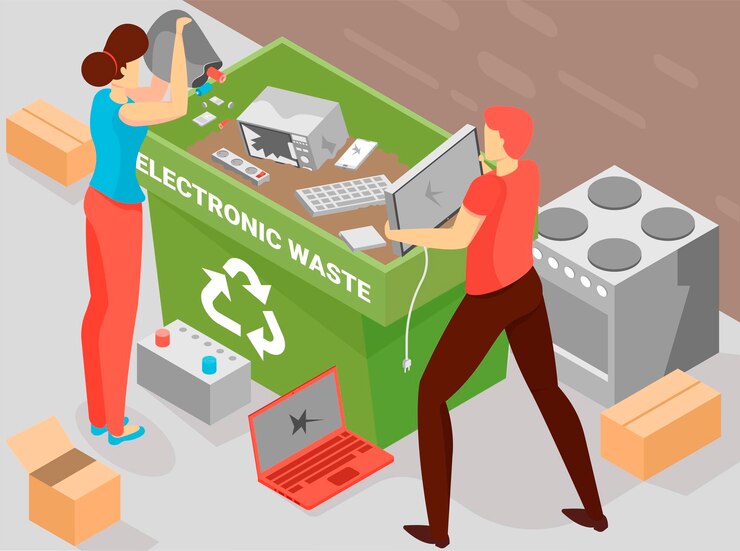Smart Waste Management: Why RFID Solutions are Essential for a Sustainable Future

Strong 8k brings an ultra-HD IPTV experience to your living room and your pocket.
Sustainability is no longer a buzzword but a critical imperative for organization, municipality, and for individuals. The management of waste has been a driving force for innovation in developing efficiency improvements, reducing a negative environmental impact, or streamlining operations. So, the latest breakthrough sought in the field is RFID waste management solutions. These technologies employ RFID to optimize waste tracking, collection, and recycling, thereby contributing extremely significantly towards a much more sustainable and efficient future.
What is RFID Waste Management?
Radio Frequency Identification (RFID) is a technology where radio waves are used for communication between a tag and a reader to transmit data quickly and accurately. RFID tags are attached to the waste bins or containers in waste management. These tags carry information such as location, volume, and frequency of waste collection, which waste management companies and municipalities use to track the movement and disposal of waste more effectively.
The major components of RFID technology applied in waste management include RFID tags, RFID readers, and software systems.
RFID Tags: These are small pieces of equipment attached to bins or dumpsters that store the data of the container.
RFID Readers: RFID readers are installed on a collection truck or at points of collection. They will read the data transmitted by the RFID tags.
Software Systems: Integrated software monitors and analyzes data from RFID tags, providing real-time insights into waste collection trends and patterns.
Role of RFID in Waste Management
1. Improved Waste Tracking
Another basic advantage of RFID Waste Management Solutions is the possible tracking of waste at every collection point to its final disposal. RFID tags allow waste management companies to collect all the necessary data regarding where and when to collect waste, providing them with a full outline of disposal patterns. This provides an account from the time it was picked up until it reaches its final destination or point of recycling.
The proper tracking of waste is as significant in optimizing logistics as it is in waste diversion activities. Knowing the volume and type of waste that is produced in certain areas would enable the municipalities to properly target their recycling initiatives and ensure that the valuable materials get diverted away from the landfills.
2. Greater Efficiency and Productivity
It is a very resource-intensive process that calls for route optimization of the collection truck, minimum time in collecting wastes, and minimum operational cost. RFID technology helps the achievement of such goals since it provides real-time information about when and where bins are full to allow for dynamic adjustment in the waste collection company's schedules.
For instance, if it indicates that a particular location has generated a huge quantity of waste, the waste collection company can dispatch its vehicle to those locations instantly due to this dynamic scheduling. This will save substantial time and fuel, reduce operational expenses, and reduce carbon emissions, which will contribute to a greener environment. Moreover, RFID automatic data collection does not involve human interference and, therefore, makes waste collection as effective as possible.
3. Cost Saving
Waste Management through RFID Systems also offers the municipalities as well as the waste management firms an important cost benefit. With the use of RFID technology, waste collection times can be reduced since bin fill levels can accurately estimate the route planning in a manner that minimizes fuel usage. Companies which collect wastes can reduce the need to conduct manual checks and produce paperworks that will surely minimize the bureaucracy involved.
Optimization of RFID routes and operations also helps save wear and tear on the collection vehicles, increasing the life span and hence money saved in maintenance. Waste management companies can also cut down on unnecessary pickups since with real-time monitoring they could know where to direct extra attention based on production to reduce the cost of disposal.
4. Sustainability Advantages
Perhaps one of the key reasons why RFID Waste Management Solutions are becoming popular today is their role in facilitating sustainability. With cities and various organizations trying to reduce environmental impacts, RFID technology holds numerous benefits in achieving a more sustainable environment:
Improved Recycling Programs: The tracking of waste can help municipalities to know the recycled materials that otherwise end up in landfills. With RFID technology, cities can focus on increasing recycling rates and minimizing contaminated waste by distinguishing recyclables, compostable, and non-recycled materials.
Waste reduction: RFID systems help monitor the trend of waste generation and allow waste management teams to provide personalized advice to residents and businesses on how they can reduce waste. For example, by providing them with tips on reducing packaging or improving waste sorting habits.
Carbon footprint reduction: RFID solutions optimize the routes of waste collection and eliminate unnecessary trips, thus helping reduce emissions and the carbon footprint of the waste collection fleet.
5. Accountability and Transparency
RFIDs increase transparency in waste management. This means that it will be possible for waste management companies, municipalities, and citizens to track the process of collecting wastes. Through the data linked to each waste bin, stakeholders can measure how frequently and efficiently the collection of wastes is done. This can help in enhancing accountability since residents and businesses can get information on the real-time schedules of collecting wastes, recycling rates, and even the environmental impact of their actions.
This will place municipalities in a position where they can report accurately about waste generation and disposal, thus ensuring regulatory compliance and being used in demonstrating the commitment to sustainability and responsibility towards the environment.
6. Smarter Billing and Fee Systems
The other area that RFID technology can be used is in bill collection systems, especially residential and commercial waste collection. RFID tags on every single bin will help track when each bin was used; waste management companies can adopt a "pay-as-you-throw" system that charges residents according to the volume of waste produced by them. This system, therefore, is fair and environmentally friendly, and wastes would be reduced and recycled in significant amounts.
Moreover, the information generated by RFID systems can also be used to track the trend and even bill customers properly for waste management collection, ensuring that the proper customers are charged correctly.
Limitations of RFID-based Waste Management Solutions
Even with so many merits, RFID Waste Management Solutions come along with some big challenges. The most significant drawback is the one-time investment that has to be done on the infrastructure development in terms of RFID tags, readers, and software. It therefore acts as a barrier for municipal entities or companies of waste management.
Moreover, for RFID systems, data integrity and connectivity are critical to ensure that in case of a malfunction or gaps in the data, there can be errors in tracking and reporting. Therefore, to maximize the use of RFID waste management solutions, the system needs to be reliable and well maintained.
This implies spread, more so in urban environments because once the RFID systems can go into action, many applications would require their work over a large scale; with this, it also takes a lot of planning as all the bins and all the trucks and also collecting points must be adequately empowered with RFID technology across population-inhabited cities.
The Future of RFID Waste Management
The potential of RFID waste management solutions is huge, and the future looks very bright. As technology progresses, we would expect even more advanced systems that integrate RFID with other technologies, such as IoT and AI. Such systems might enable even more advanced analytics and predictive maintenance while continuing waste collection optimization.
With the increasing relevance placed by governments, organizations, and communities on sustainability, RFID waste management systems will be a significant solution for the pursuit of a zero-waste goal and reductions in carbon emissions alongside the improvement of recycling programs.
The future of sustainability, which is being achieved throughout the world, will involve becoming a smarter, greener city by implementing RFID Waste Management Solutions.
Conclusion
The integration of RFID Waste Management Solutions marks the first step toward an increasingly sustainable, efficient, and cost-effective waste management system. Better tracking of waste, higher recycling activities, reduced costs, and sustainability for the environment are being set through RFID solutions on their way to a smarter future. These advantages would be complemented by the addition of residential waste collection software to the system and ensure that at the household level, waste management is efficient, thus streamlining operations further and pushing for sustainability.
Note: IndiBlogHub features both user-submitted and editorial content. We do not verify third-party contributions. Read our Disclaimer and Privacy Policyfor details.







